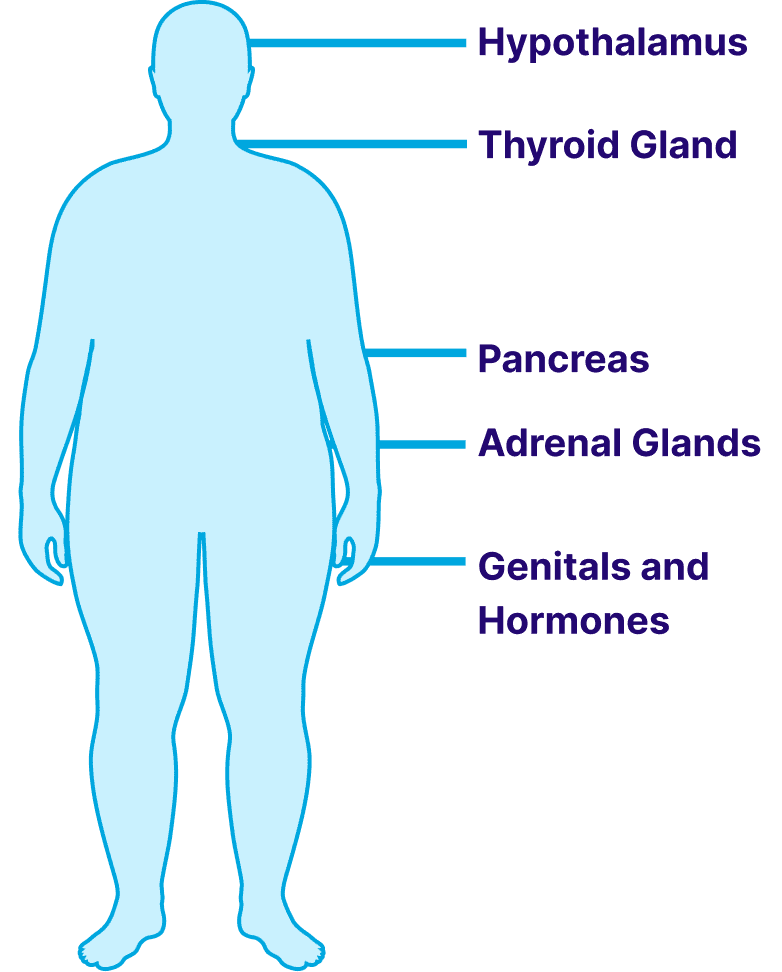Understand the Conditions
POMC and PCSK1 Deficiencies
Proopiomelanocortin deficiency, also known as POMC (pronounced POM-see) deficiency, and proprotein convertase subtilisin/kexin type 1 deficiency, known as PCSK1 deficiency, are rare genetic diseases.
People living with these diseases have specific gene changes, or variants, that keep the brain from understanding that the body is full.
While they are distinct diseases, both POMC and PCSK1 deficiencies can be passed to a child if both parents have variants in their genes.
Symptoms of POMC deficiency
Hormone level differences are also known as endocrine abnormalities. The endocrine system is made of organs, glands, and hormones that control many functions in the body. This system influences:
- How your heart beats
- How your body uses the food you eat
- How you grow
- Many other important body functions
An endocrine abnormality means that one or more parts of the system are not working the way they should.
Some people, but not all, may also have:
- Red hair and light skin pigmentation
- Mildly low thyroid hormone levels
- Adrenocorticotropic hormone (ACTH) deficiency
- Delay in puberty caused by hormonal imbalances
- Liver disease
Key components of the
endocrine system

Symptoms of PCSK1 deficiency
- Digestive issues, including upset stomach and diarrhea within the first weeks of life
- Kidney issues, including a build-up of acid and excessive thirst
- Hormone level differences like endocrine abnormalities
Hormone level differences are also known as endocrine abnormalities. The endocrine system is made up of organs, glands, and hormones that control many functions in the body. This system influences:
- How your heart beats
- How your body uses the food you eat
- How you grow
- Many other important body functions
An endocrine abnormality means that one or more parts of the system are not working as they should.
Because of endocrine abnormalities, people with PCSK1 deficiency can be at a higher risk of developing:
- Diabetes
- Low insulin levels in the blood
- Low blood sugar after meals
- Low thyroid levels
Key components of the
endocrine system

Two key symptoms of POMC and PCSK1 deficiencies related to weight include:
Constant, hard-to-control hunger (known as hyperphagia)
Severe, early-onset obesity
Hunger and obesity due to POMC and PCSK1 deficiencies
Babies with POMC deficiency usually have a normal weight at birth. Within the first few weeks of life, they can start showing signs of being hungry all the time (like crying constantly to be fed) and rapidly gaining weight. Babies with PCSK1 deficiency may initially have failure to thrive in infancy but eventually will have weight gain.
After gaining weight, babies affected by POMC or PCSK1 deficiency usually reach a body mass index (BMI) at or above the 95th percentile for their age. Most people with these deficiencies also continue to have constant, hard-to-control hunger and severe obesity as adults.
How POMC and PCSK1 deficiencies are inherited
POMC and PCSK1 deficiencies are inherited in what is called an autosomal recessive manner. This means that someone with POMC or PCSK1 deficiency will have two copies of the genetic variant that causes the disease.
If you have only one copy, you are considered a "carrier" and typically won't experience symptoms of the disease. You can only inherit an autosomal recessive disease if both of your parents are carriers and each passes down the genetic variant to you.
In very rare cases, someone who has just one disease-causing gene variant may develop some of the symptoms. This is known as POMC or PCSK1 heterozygous deficiency.
Diagnosing POMC or PCSK1 deficiency
If your doctor suspects POMC or PCSK1 deficiency based on clinical signs and symptoms, a genetic test can be ordered to help aid in a diagnosis.
Explore a treatment option for obesitydue to POMC or PCSK1 deficiency

Watch how Karen and her son Nate, who lives with POMC deficiency, coped through finding a diagnosis.
Preparing to talk with your doctor
about POMC or PCSK1 deficiency?
Educational resources and support for POMC
or PCSK1 Deficiency

Actor portrayal
Connect with a dedicated point of contact who can help support you through your journey of living with POMC or PCSK1 deficiency.
InTune is your source for one-on-one personalized support,* available throughout your journey. This program provides resources, education, and information tailored to fit your unique needs.
* Patient Education Managers are employees of Rhythm Pharmaceuticals and do not provide medical care or advice. We encourage you to always speak to your healthcare providers regarding your medical care.